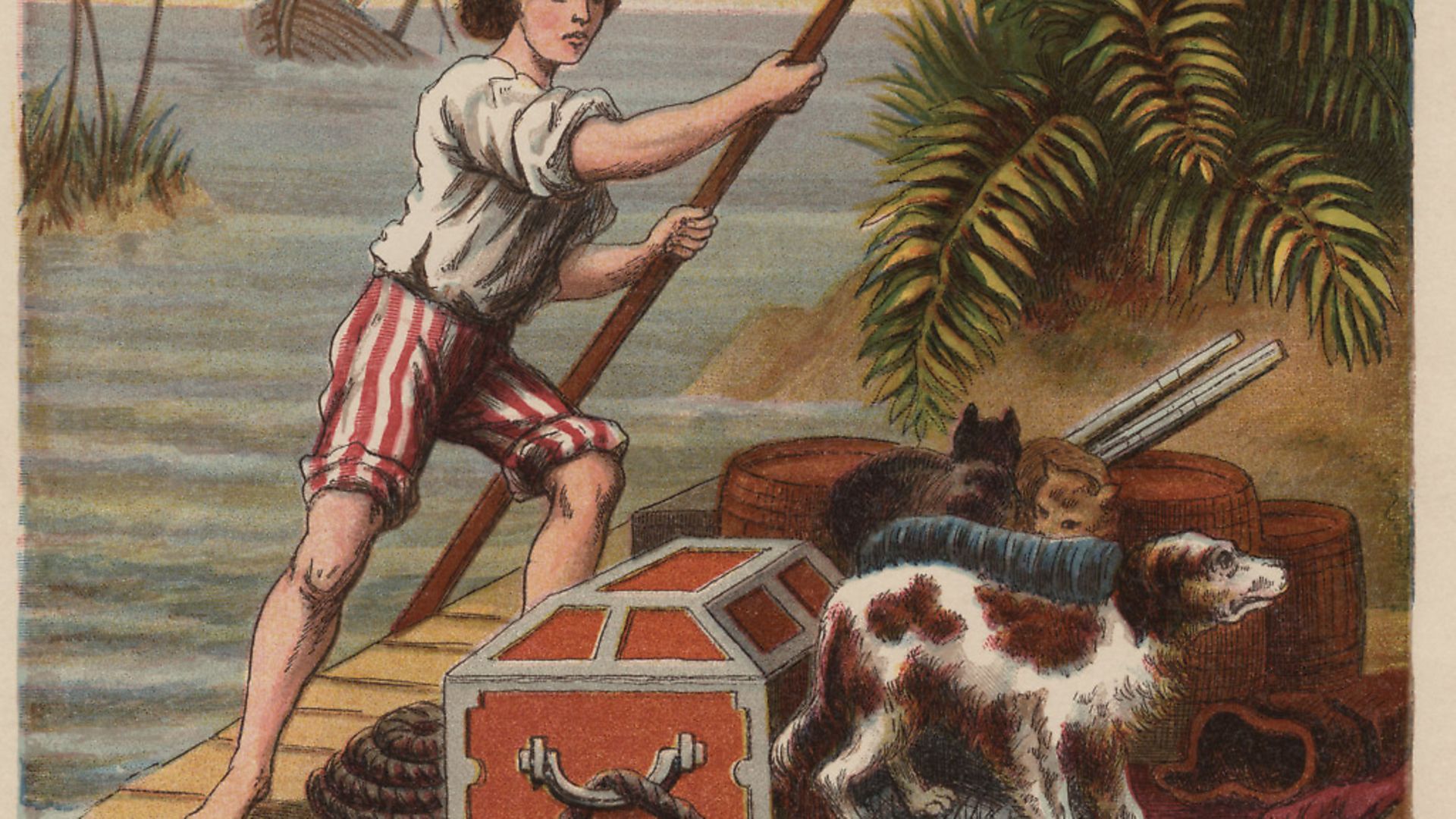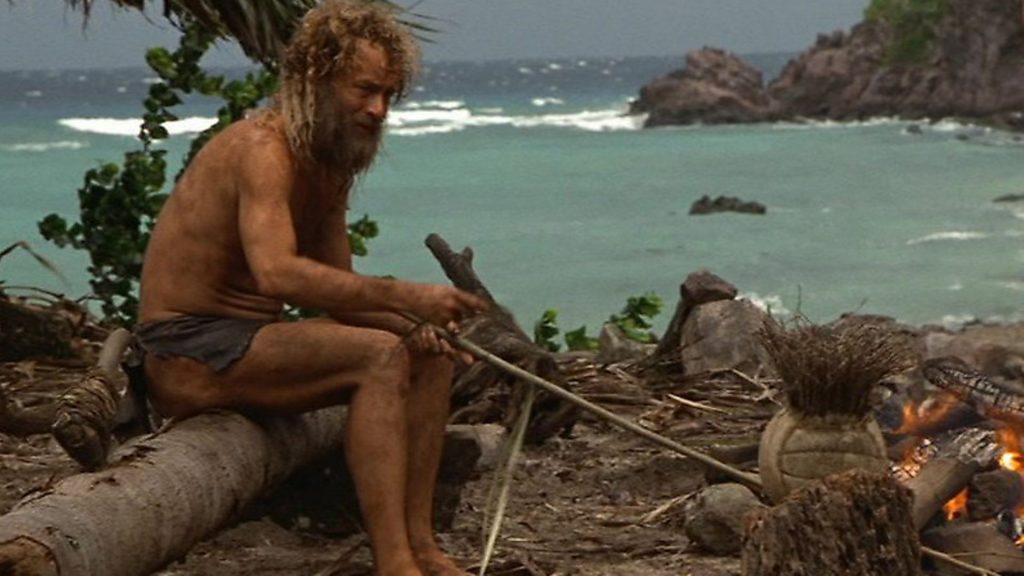
It may have been set on a tropical island with a limited cast, but Robinson Crusoe tells the story of the birth of the modern age. On its tercentenary, IAN WALKER explains how

There has always been a bit of a question mark over Daniel Defoe’s reputation as a writer. This is a bit surprising, seeing as he practically invented the modern novel (a bold claim – but it’s one that is made by many, and it is one I’m sticking to).
Within weeks of Defoe’s novel Robinson Crusoe being published in 1719, Charles Gildon had written a retort, The Life And Strange Surprising Adventures of Mr D—- de F–, of London, hosier, which criticised the book for what the author called its low prose style. Gildon was trying to cash in on the swift success of Defoe’s novel, which had been an instant bestseller and which was to run to four editions before the year was over.
Pope and Swift, the two literary giants of the Augustan age, were also a bit wary of Defoe as a writer. Alexander Pope argued ‘the first part of Robinson Crusoe is very good – De Foe wrote a vast many things; and none bad, though none excellent, except this’. The less-accommodating Jonathan Swift was reported to have said of Defoe that he was ‘so grave, sententious, dogmatical a rogue, that there is no enduring him’, and this despite Robinson Crusoe being an obvious influence on, or antecedent to, Swift’s Gulliver’s Travels.
What was behind this sniffy altitude towards Defoe? Part of it may have been good old-fashioned snobbery. He didn’t receive an Oxbridge education (though neither did the Catholic Pope or the Irish Swift) and he was not versed in the Classics; there would be little obvious metaphysical wrangling told through references to Jove or Dionysus in Defoe’s prose. Jealousy would also have played a part; he was the literary superstar of 1719 and was one that ‘crossed over’ to the mainstream, by inventing an audience that didn’t exist before. His novel had helped create a new following for reading.

But it was also because Defoe had a reputation for being a hack writer and a chancer. He wrote for money (he was a man driven by the bottom line) and there is evidence that he would write for both sides of an argument for the right fee. Swift had a point when he called Defoe a rogue.
Three hundred years on, Defoe still effortlessly attracts his critics. In the Guardian last month Charles Boyle accused Robinson Crusoe of being the exemplar par excellence of the elitist, imperialist literature of dead white men (and, writing under his pen name Jack Robinson, Boyle claims in his new book Good Morning, Mr Robinson that Crusoe was the prototypical Brexiter).
For Boyle the book is uncritical of slavery, of Eurocentrism, and it takes place in a world mostly without women. What’s more, for Boyle, the book ‘is just dull: there’s not much of a story, and the writing is pedestrian’. Boyle had little difficulty wheeling out great names from the canon – EM Forster, Walter De La Mare, Robert Louis Stevenson – to back up his dislike for the book.
So does Defoe deserve this reputation for being a hack or a chancer in the eyes of his contemptuous contemporaries – or, in the eyes of our contemporaries, the dead white male champion of the capitalist slave trade? To begin to answer that question, it’s useful to turn to Defoe the man and recount something of his extraordinary life.
Daniel Defoe (1660-1731) somehow managed to fit five careers into one lifetime. Firstly, he was a merchant and businessman. He traded wine and woollen goods with some success: at one point he would have a country estate and would own a ship. But at others he failed and spent periods in debtors’ jail. According to Defoe himself, ’13 times I have been rich and poor’.
Connected to his career as a merchant, Defoe was a factory owner. He owned a tile and brick factory in Tilbury (bricks from his factory built the Greenwich Hospital). He would also be involved in all sorts of business plans, some sensible, some less so, some deplorable; he was a treasure seeker, perfume manufacturer (using the musk of cats), speculator, maritime insurer and he had connections to the slave trade.
A measure of Defoe’s statue as a businessman was that he was good friends with William Paterson, one of the men who set up the Bank Of England. Defoe moved in the circles that were then in the process of inventing the modern capitalist political economy. As such, the writer understood, way before most, that capitalism is a process of the invention whereby debt is transformed into something tangible and solid. In their excellent book, Daniel Defoe and the Bank of England, Valerie Hamilton and Martin Parker argue that this process is much like how a novel invents fictional worlds or invents the fictional subjectivity of others. In Daniel Defoe, the creativity of modern finance and modern literature were entwined at birth.
However, another measure of Defoe’s success as a businessman was that he tended to have escape routes planned out – sometimes with ropes and ladders – just in case he had to flee his creditors quickly.
Secondly, Defoe was a political activist. In the first half of the 18th century, you could not separate religion from politics. Defoe was a Dissenter and a Nonconformist, which put him broadly on the side of the Whigs. At times his politics were clear. He played a part in the failed Monmouth Rebellion, the attempt to overthrow the Catholic James II, and was lucky to escape with his life as many of the rebels were sentenced to death or deportation by the alcoholic, vengeful and deranged Judge Jeffreys during the infamous Bloody Assizes trial.
Then, after James II fled, when the Protestant William of Orange ‘invaded’ England by landing at Brixham in 1688, Defoe was one of those who rode to meet him. Defoe would become one of William III’s chief pamphleteers – bringing us to Defoe’s third career, as a writer.
Defoe wrote about all sorts of subjects, from politics and economics to ghost stories. Much of this writing was churned-out hackery. No one knows how much he produced (he wrote under pseudonyms – maybe as many as 195) and his output may have run to almost 550 different books, pamphlets and volumes, although the figure is probably nearer 300. His articles ran into the thousands.
But among Defoe’s hackery and his expedient political pamphleteering much was brilliant. His writings on economics, which drew on his practical experience as a businessman, were among the first to theorise how modern political economy worked. And his book The Storm, which described the catastrophic storm of 1703, in which 8,000 people were said to have died, was one of the first works of modern journalism. His book The Journal of the Plague Year – a fictional description of someone describing the plague in a journalistic way – is stylistically not that different from the New Journalism of the 1960s. There is a connection between Daniel Defoe and Tom Wolfe.
But Defoe’s writing created all sorts of difficulties for him, and for us when we try to work out what he thought or believed. In 1702 Defoe wrote The Shortest-Way with the Dissenters; Or, Proposals for the Establishment of the Church which was probably intended as an ironic send-up of an extreme Tory view of Dissenters. But, as irony or satire, it failed. Defoe’s work was indistinguishable from the radical, intolerant, Tory voices he trying to mock.
In this case, Defoe was probably just being too clever for his own good, but there are other instances where it was never clear which side he was on when he wrote on the issues of the day. If he wrote today he may well have been in this newspaper, writing about what a scoundrel Farage is, and then in the Daily Mail writing about Rees-Mogg being the man of the moment.
The immediate consequence of The Shortest-Way with the Dissenters… debacle was that everyone – Whig and Tory alike – got angry, and Defoe was put in the pillory before being sent to Newgate prison. But then, in that slippery way Defoe had, he was released from jail by the Tory politician Robert Harley, who then set him up in his fourth career, as a spy.
Using his business career and his journalism as cover, Defoe worked in government intelligence for the Tory party (who he was against, politically). His brief was to gather information, mostly in Scotland, in the politicking that led up to the Act of Union in 1707. By instinct, Defoe would have leaned towards the Scottish Presbyterians, but that didn’t stop him writing whatever was required of him by those on both sides of the political divide.
Then there was Defoe’s fifth career, as a novelist. Logically, you should file this fiction-writing under his career as a writer, but if you did that you would not be doing justice to this part of his life. It wasn’t just that he was a novelist, he was one of the first modern novelists. In writing Robinson Crusoe, he created a new art form. He dramatised subjectivity and invented a new way to describe not just the world, but a time where so much was new. He lived in a historically-charged era, where lots of things – fundamental things – changed very rapidly.
He was probably born in 1660, but there is some doubt about the exact date. He may have made it up – he really was a professional liar. His name certainly wasn’t Defoe – it was Foe, he added ‘De’ because it was fancy. It may be that Defoe also shifted his birth date to 1660, because it was an important year in English history, right up there with 1066, 1832 and 1945.
This was the year of the Restoration. England’s 11-year Commonwealth experiment as a republic had ended, and out went the puritanical and straightened culture that had gone with it. The hectors, proselytisers and ideologues fell from fashion and in their place came the sceptics, chancers and improvisors.
A spirit of freedom flooded through the country after 1660. Theatres re-opened and spa towns began to flourish as places of sexual infidelity, dodgy medicine and gossip. Intellectual curiosity began to creep back in. Open debate became a key aspect of political civil society. People kept diaries that described a society that was fluid and energetic. And, most significantly of all, commerce and trade transformed England – and London in particular – into something global. Here were the origins of the British empire and the start of the global economy.
But Defoe’s lifetime didn’t just see a series of rapid cultural, political and economic transformations. It also saw a series of catastrophes befall England: The Great Plague, when he was a child, the Great Fire of London, the Great Storm and a series of bitter winters that formed what was called the Little Ice Age.
It was a tumultuous world in which, despite his spells in prison and debtors’ jail, he thrived. He was clearly a man of immense energy who threw himself into London and this rapidly changing era, where nothing seem fixed and everything seemed up for grabs.
There is not room in this article to run through of all the details of Defoe’s multifaceted life; indeed, it’s not that easy to run through all the details in the many excellent, 500-plus page biographies that have been written about him. It’s not easy writing a book about someone who lied a lot, who wrote under pseudonyms and who tended to cram more into a year than most would get through in a life.
But, by turning to Defoe’s fiction writing you can begin to piece together all those various strands of his life and the various strands that shaped his age. And it was in Robinson Crusoe where he managed to hold so much of his age in his imagination.
It is a novel packed with detail. It is meticulous in the way it describes getting stuff done: Growing crops, building a shack, hunting goats, drying raisins, making tools and so on. It is hard to think of another novel so immersed on the prosaic details of just doing stuff. The only other that springs immediately to my mind is Frederick Forsyth’s blockbuster, The Day of The Jackal – hardly a literary work. And while Forsyth’s novel is a thrilling to-do list about how to murder a Frenchman, Defoe’s is a vivid and precise description of the birth of modern political economy and the Protestant work ethic.
His to-do list creates a metaphor for his age, when commerce superseded feudalism and the idea took hold that the autonomous individual in a private relationship with God could, though effort and intelligence, create his (and it was almost always ‘his’) own place in the world.
In reality, that world existed in its highest and most dramatic form in the dynamism and dangers of London. But Defoe re-imagined it all in the life of one man, stuck on an island. Crusoe’s survival on his desert island became a mirror for the mass and mess of the birth of the new capitalist age.
That Defoe’s metaphor worked so well is obvious. That idea of an individual or group marooned on an island, attempting to survive in a way that says something about human nature and modernity, can be traced through all sorts of strands of culture from Defoe’s day to ours. It is there in endless stories that were inspired by Crusoe, from The Swiss Family Robinson, to Castaway, to Matt Damon being stranded on Mars in The Martian. Then there are the endless cartoons which use being shipwrecked on a desert island as the framing device of the gag; there’s Desert Island Discs; even I’m a Celebrity… has a trace of Robinson Crusoe in its DNA, in the way that it says lots (too much perhaps) about the modern world.
But the significance of Defoe’s novel is not just the longevity of its influence, or even its breadth – from the 17th century political economy to Ant & Dec. The book was an act of unprecedented imagination. In it, Defoe managed to not just invent a fictional, believable, rounded subjectivity on the written page (and there were others doing similar things at the same time), he did it in a way that collapsed much of his world into that subjectivity. In other words, he described modern man at the very moment that modern man was coming into being.
Why was Defoe able to this? One reason may have been was that he was no ideologue. England in the Cromwellian and Puritan decades before his birth had been dominated by ideology. It had been an age of prescriptive hectoring, of ‘Thou shalt not’ and of absolute political insistences (not entirely unlike what you might find in a 2019 Guardian book review). Defoe would not have fitted in that age. He was too tied up in the mess of life to hold fixed principles. He had a tendency to forgive and to find goodness in others. He was too busy getting on with life to be that judgemental.
He seems to have been someone who put great store in experience. He learnt from the world, from mistakes and from his enemies, some of whom would become his allies. He was a compromiser, a chancer and an improviser. He had his beliefs, but he was happy to compromise and to adapt and even to contradict himself.
With a worldview like that, it is no wonder that his novel still works for us three centuries on. Ideologies come and go but the attempt to try to stay in charge of ourselves while screwing up spectacularly seems a fixed part of the human condition.
There is fault in Robinson Crusoe, as there was fault in Defoe, but the novel’s achievements are to do with the triumph of the writer’s imagination and invention. It effortlessly outstrips the sneering critiques of his contemporaries and the prescriptive critiques of our contemporaries.
Robinson Crusoe has been translated more than any other book except the Bible, and this is because it was the first great imagining of the modern world. Read the book now and there is a good chance that this 300-year-old story – which is full of the values of a different age; of slavery and empire – will, at the level of imagination, strike you as something entirely modern.










